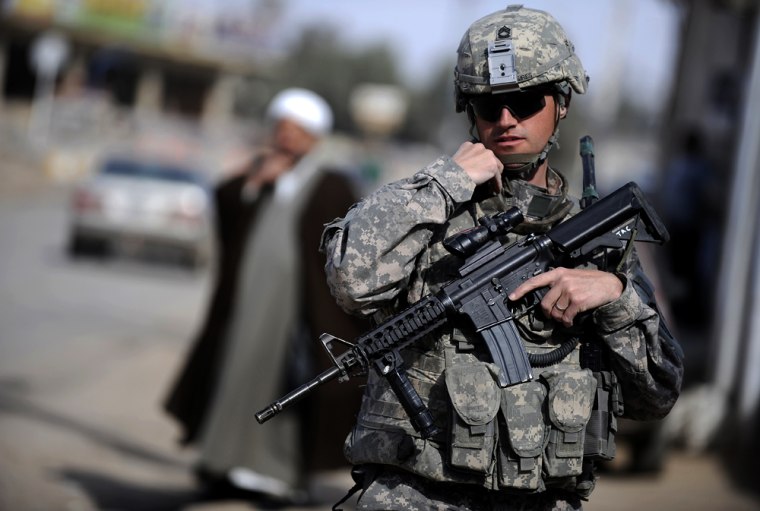Some of the U.S. forces likely to remain in Iraq after President Barack Obama fulfills his pledge to withdraw combat troops would still have a combat role fighting suspected terrorists, the Pentagon said Wednesday.
Obama could announce his withdrawal strategy as early as Friday. He will travel that day to Camp Lejeune in North Carolina, the White House announced Wednesday.
While there Obama is expected to outline a compromise withdrawal plan that leaves behind as many as 50,000 troops for cleanup and protection operations.
Although most of the fighting forces would be withdrawn in the next 18 months, some of those units could be in Iraq for years to come. An agreement forged by the Bush administration with Iraqi officials requires removal of all U.S. forces by 2012.
Defense Secretary Robert Gates has said that a holdover, or "residual," force would number in the tens of thousands.
His spokesman said Wednesday that assuming there is such a force, it would have three primary functions: Training and helping Iraqi forces; protecting Americans and U.S. assets in Iraq and limited counterterrorism operations in which Iraqi forces would take the lead.
"I think a limited number of those that remain will conduct combat operations against terrorists, assisting Iraqi security forces," Pentagon spokesman Geoff Morrell said. "By and large you're talking about people who we would classify as enablers, support troops."
Freeing up troops, resources
Obama campaigned on ending the Iraq war, and pledged to do so in 16 months. The withdrawal timetable he is expected to approve would stretch over 19 months, counting from Inauguration Day. That means more than 100,000 troops would leave over the coming 18 months.
The pullout would free up troops and resources for the war in Afghanistan, where Obama has said the threat to national security remains high.
"We are now carefully reviewing our policies in both wars, and I will soon announce a way forward in Iraq that leaves Iraq to its people and responsibly ends this war," Obama said in his address to Congress on Tuesday.
Gates, Joint Chiefs of Staff Chairman Adm. Mike Mullen and others met with Obama at the White House on Wednesday. There was no announcement afterward.
"The president has not made a final decision about our force structure in Iraq going forward," White House spokesman Robert Gibbs told reporters Wednesday. "I don't think it would be a surprise, though, to anybody in this room that the president since his first full day in office has been working toward a solution that would responsibly draw down our troops in Iraq."
Morrell said he anticipates an announcement this week.
'War zone' designation
The role and makeup of residual forces has been unclear throughout last year's negotiations between the United States and Iraq, and during Obama's planning for an exit strategy.
Plans became only slightly clearer Wednesday. Morrell said many troops would be long-term advisers in such areas as intelligence, or would help the Iraqi military fill in gaps in equipment such as helicopters.
Although he said Iraq would still be considered a "war zone," Morrell said most remaining forces would not do anything that resembles fighting.
"But just because these troops would carry a sidearm, as all U.S. troops do in theater, that should not be confused with them having a combat mission," Morrell said.
"For example, U.S. personnel assigned to the Ministry of Finance may have a sidearm, but I doubt they'd consider themselves a combat force, and certainly wouldn't be equipped in that fashion to perform combat operations."
